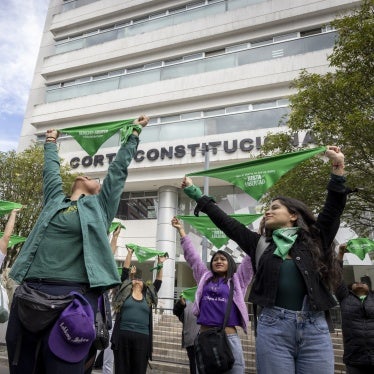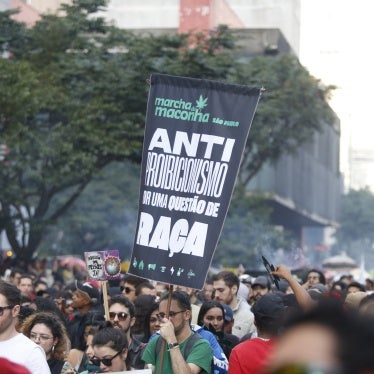Washington, D.C., December 11, 2013
Alejandro Ordóñez
Inspector-General of Colombia
Inspector-General’s Office of Colombia
Bogotá, D.C. - COLOMBIA
Dear Inspector-General Ordóñez,
I am writing to express my concern over the disciplinary investigation the Inspector-General’s Office opened against Representative Iván Cepeda Castro for collecting information about possible human rights violations and submitting it to the justice authorities. A prominent human rights defender and member of the Human Rights Commission of Congress, Representative Cepeda is widely respected in Colombia, Washington and elsewhere for his firm commitment to protecting the rights of victims of Colombia’s internal armed conflict. Human Rights Watch is concerned that your office’s investigation not only appears to be unjustified, but also that it could have a chilling effect on public officials and others who seek to promote accountability for human rights violations.
On August 1, 2013, your office opened an investigation against Representative Cepeda for “abuse of public function” and “procedural fraud.” The investigation relates to interviews Representative Cepeda carried out in various prisons with ex-paramilitaries about former President Álvaro Uribe’s alleged ties to paramilitaries, which he subsequently submitted to prosecutors. The Inspector-General’s Office’s investigation is based on a complaint filed by Mr. Uribe’s lawyer alleging that Representative Cepeda was authorized to visit prisons to verify the human rights conditions in detention centers—and not to conduct interviews about paramilitary crimes—and that he knowingly delivered false information from the interviews to justice authorities. Mr. Uribe has also alleged that Representative Cepeda gave money to the family of one of the ex-paramilitary witnesses, an accusation we believe may form part of your office’s investigation.
There are three main reasons why it is unfounded to investigate Representative Cepeda for “abuse of public function,” an infraction that occurs when a public servant “abuses his post to carry out public functions that are different from those that legally correspond to him.”
First, in collecting information from ex-paramilitaries about the creation of paramilitary militias and the alleged human rights crimes these groups committed, Representative Cepeda carried out one of the main functions that legally corresponds to him as a member of the Human Rights Commission of Congress. Article 57 of Law 5 of 1992 provides that a primary function of the Human Rights Commission is “the defense of human rights.” To interview potential witnesses about alleged human rights violations and submit the information to prosecutors is a fundamental activity in “defense of human rights.” This is true irrespective of whether the initial purpose of Representative Cepeda’s visits to the prisons where he interviewed the detained ex-paramilitaries was to verify the conditions under which prisoners are detained. For example, if while visiting a prison to inspect sanitary conditions, an Ombudsman’s Office official receives complaints of torture from detainees, he would not violate the law by listening to the complaints and sharing them with the competent judicial authorities. Rather, he would help to uphold it.
Second, even in the hypothetical scenario that Representative Cepeda was not a member of the Human Rights Commission, his actions still would not have constituted “carry[ing] out public functions that are different from those that legally correspond to him.” This is because interviewing people about potential human rights violations and delivering the information to justice authorities is not an exclusively “public function,” but rather one that all citizens—whether private individuals, public servants, or NGO workers—have the right to carry out. The General Assembly of the Organization of American States has repeatedly emphasized the obligation on the part of member states to ensure that the work of human rights defenders “can be carried out in a free, transparent, and open political environment.” I do not think anyone would argue that Human Rights Watch employees perform the public function of the Attorney General’s Office when we interview witnesses about human rights violations in Colombia and submit our reports to justice authorities. The same standard should apply to Representative Cepeda. In that regard, it is worth noting that Representative Cepeda did not depose the ex-paramilitaries under oath as part of an official judicial procedure; rather, he interviewed them on camera with their consent and the prior authorization of prison authorities, and turned the recordings over to authorities.
Third, Representative Cepeda was legally obligated to submit the ex-paramilitaries’ statements to the Attorney General’s Office. Article 67 of the Criminal Procedural Code provides that public servants who become aware of the commission of a crime are obligated to “immediately report the event to the competent authority.” Representative Cepeda would have been in breach of this legal obligation had he failed to provide prosecutors with the ex-paramilitaries’ statements, which allege multiple serious crimes, including the formation of paramilitary groups and killings. Indeed, by failing to report the statements, he could have come under investigation by the Inspector-General’s Office, which according to Article 278 of the Constitution, should remove from office public servants who act with “manifest negligence” in “denouncing criminal acts that they become aware of as a result of exercising their posts.”
The Inspector-General’s Office’s investigation into Representative Cepeda for “procedural fraud” also appears to be unfounded. Human Rights Watch is unaware of a single compelling piece of evidence indicating that Representative Cepeda provided the Attorney General’s Office with “fraudulent” testimony in order to “induce them into making an error,” as the crime of procedural fraud requires.
Clearly, justice authorities will ultimately determine the veracity of the ex-paramilitaries’ statements; however, there are no reasons to believe that Representative Cepeda manipulated or intentionally produced false testimony in order to deceive justice officials. The fact that prosecutors re-opened a preliminary investigation into Mr. Uribe based on the ex-paramilitaries’ statements suggests that they have a certain level of prima facie credibility, and were not so manifestly spurious as to have warranted Representative Cepeda refraining from submitting them to justice authorities.
It is not true that Representative Cepeda gave money to the family of one of the ex-paramilitary witnesses, as Mr. Uribe has alleged. In reality, the Fundación Comité de Solidaridad con los Presos Políticos, a human rights organization, provided the family members of one of the witnesses with three payments to cover the expenses of relocating to a different city. The human rights organization funded the family’s relocation as a protection measure in light of the risks to their security. The payments were made out of the Fundación Comité de Solidaridad con los Presos Políticos’s specially designated fund for protecting victims and witnesses.
In a country where impunity is the rule for human rights violations, it is crucial that all sectors of society—ranging from NGOs to public officials—collaborate with the justice system to improve accountability for these crimes. Rather than punishing those who have fulfilled their legal and civil duty, the Inspector-General’s Office should direct its efforts at sanctioning public servants who fail to report or assist in the investigation of alleged human rights violations.
We hope that these observations are taken in constructive terms, given that they reflect our deep concern over the impact the investigation against Representative Cepeda could have on the legitimate and indispensable activity of denouncing grave human rights violations in Colombia.
Sincerely,
José Miguel Vivanco
Human Rights Watch








